Orpheus Blu-ray Movie
HomeOrpheus Blu-ray Movie 
OrphéeCriterion | 1950 | 96 min | Not rated | Aug 30, 2011
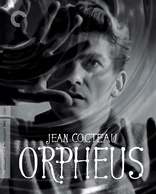
Movie rating
8 | / 10 |
Blu-ray rating
| Users | 4.5 | |
| Reviewer | 5.0 | |
| Overall | 4.7 |
Overview
Orpheus (1950)
Orpheé is a successful Parisian poet, whom—despite popular acclaim—feels isolated and uninspired. When his wife Eurydice is stricken down by leather-clad bikers, he pursues them into the underworld, where he falls into a romantic entanglement with the dark-haired beauty Death.
Starring: Jean Marais, François Périer, María Casares, Marie Déa, Juliette GrécoNarrator: Jean Cocteau
Director: Jean Cocteau
| Foreign | Uncertain |
| Drama | Uncertain |
| Romance | Uncertain |
| Imaginary | Uncertain |
| Fantasy | Uncertain |
Specifications
Video
Video codec: MPEG-4 AVC
Video resolution: 1080p
Aspect ratio: 1.33:1
Original aspect ratio: 1.37:1
Audio
French: LPCM Mono
Subtitles
English
Discs
50GB Blu-ray Disc
Single disc (1 BD)
Playback
Region A (locked)
Review
Rating summary
| Movie | 5.0 | |
| Video | 4.5 | |
| Audio | 4.5 | |
| Extras | 5.0 | |
| Overall | 5.0 |
Orpheus Blu-ray Movie Review
Reviewed by Dr. Svet Atanasov September 1, 2011Jean Cocteau's "Orphée" a.k.a "Orpheus" (1950) arrives on Blu-ray courtesy of Criterion. The supplemental features on the disc include the film's original theatrical trailer; episode of the French television series In Search of Jazz; documentary film directed by Edgardo Cozarinsk; video interview with assistant director Claude Pinoteau; archival interview with director with Jean Cocteau; collection of stills by French portrait photographer Roger Corbeau; new audio commentary by French film scholar James Williams; and more. The disc also arrives with an illustrated booklet featuring an essay by author Mark Polizzotti, selected Jean Cocteau writings on the film, and an essay on La villa Santo-Sospir by film scholar James Williams. In French, with optional English subtitles for the main feature. Region-A "locked".
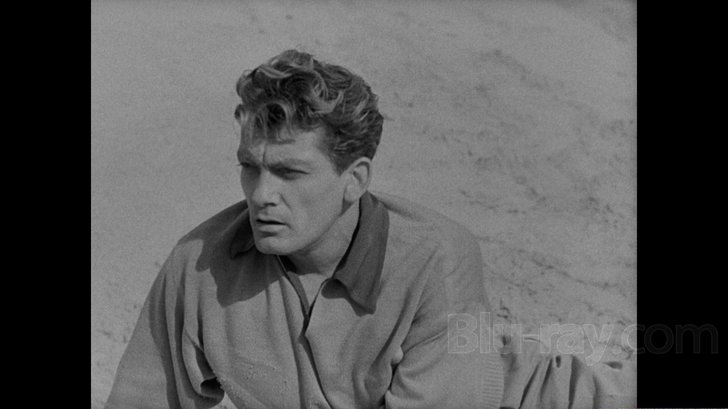
Jean Marais as Orpheus
Jean Cocteau’s film is a fascinating take on the classic Greek myth of Orpheus, the greatest of all musicians, who entered Hades, the land of the dead, to bring back his deceased wife Eurydice. After he passed the river Styx, the gods heard Orpheus play his harp and were so moved by his music that they agreed to let him take his beloved Eurydice back to the land of the living – on the condition that he never looks at her while passing through the underworld.
In Cocteau’s film, Orpheus (Jean Marais, Beauty and the Beast, The Iron Mask) is a famous poet who lives on the outskirts of Paris together with his beautiful wife Eurydice (Marie Dea, Secrets, The Devil's Envoys), a former waitress. Both are madly in love with each other and can’t live without one another.
While visiting a famous café on the Left Bank, Orpheus witnesses a riot instigated by a group of radical poets. When the police arrive and attempt to arrest the troublemakers, one of the poets, Cegeste (Edouard Dermit, Les Enfants Terribles), is accidentally run over by two bikers. Out of nowhere, a black Rolls-Royce with a beautiful woman (María Casares, Children of Paradise, La letrice) appears. She orders her chauffeur, Heurtebise (Francois Perier, La Samourai, Z), to take the wounded body and asks Orpheus to join her as a witness. Assuming that they will be heading to the nearest hospital, Orpheus quickly jumps in the Rolls-Royse.
Along the way, however, Cegeste dies, and the woman orders Heurtebise to drive them to her mansion. There, much to Orpheus’ dismay, she brings Cegeste back to life and quietly announces that she is his Death. Shortly after, she escorts him to the underworld while the overwhelmed Orpheus falls asleep.
When Orpheus wakes up, Heurtebise informs him that he has been ordered to drive him back to the city. By the time they reach his home, Orpheus is already obsessed with the mysterious messages coming from the car’s radio because they have suddenly inspired him to write like Cegeste and his radical friends.
Meanwhile, the woman from the Rolls-Royce arranges that Eurydice also travels to the underworld. Assisted by Heurtebise, Orpheus follows her, but is consequently presented with a difficult dilemma when he meets the woman and she reveals to him the reason behind Eurydice’s journey.
Cocteau’s Orpheus is a remarkably stylish and in many ways surprisingly modern fantasy film that accomplishes a lot with very little. It does not always follow conventional logic, but it is not a ridiculous exercise in style either. There is a good reason for everything that Orpheus experiences as well as plenty of fascinating observations about the meaning of life, death and art for the viewer to ponder.
The visual beauty of the film comes from its simplicity. Entire sequences, for instance, are played backwards to create the illusion that dying is a reversible process, while elsewhere images are carefully and effectively overlapped when the main characters leave the world of the living and enter the underworld.
Cocteau’s fascination with the mirror – the object reflecting all physical forms and the invisible mirror reflecting our inner being – is again felt. In fact, the film’s entire narrative is structured by the philosophical principle of duality (which dictates that everything is created in pairs). Naturally, as far as Cocteau is concerned the dilemma is not whether the underworld exists and death can be reversed, but whether it is worth to enter it and do it. Wonderful film.
Note: In 1951, Orpheus was nominated for BAFTA Award for Best Film from any Source.
Orpheus Blu-ray Movie, Video Quality 
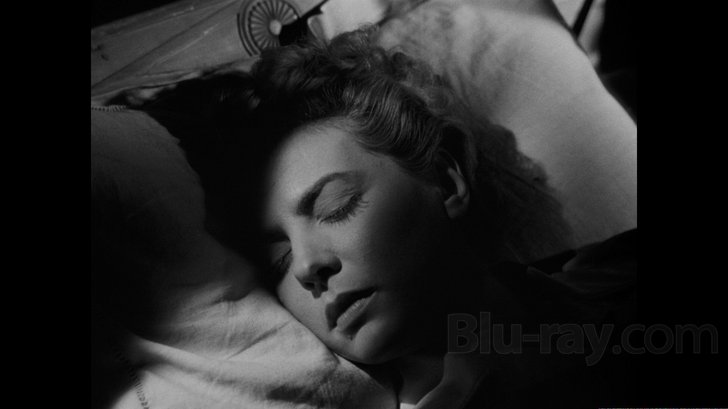
Presented in an aspect ratio of 1.33:1, encoded with MPEG-4 AVC and granted a 1080p transfer, Jean Cocteau's Orpheus arrives on Blu-ray courtesy of Criterion.
The film's transition to Blu-ray is very impressive. I've seen Orpheus a number of times during the years and this is clearly the very best the film has ever looked. If you project your films on a large screen, I guarantee you are in for a very, very special treat.
Detail is wonderful throughout the entire film. The daylight scenes, in particular, look lovely (see screencaptures #8 and 19). Contrast levels and especially clarity have also seriously benefited from the film's transition to Blu-ray - many of the previously problematic blocky patterns during the darker indoor sequences now look healthy and notably clearer. Color reproduction is also a lot more convincing, with the variety of grays and blacks looking a lot richer and better balanced. Edge-enhancement is never an issue of concern. Though some careful noise corrections have been applied, the film's grain structure is also fully intact. I did not notice any serious artifacts or banding issues. Aside from a few very small frame skips, there are no serious stability issues to report in this review either. (Note: This is a Region-A "locked" Blu-ray disc. Therefore, you must have a native Region-A or Region-Free PS3 or SA in order to access its content).
Orpheus Blu-ray Movie, Audio Quality 
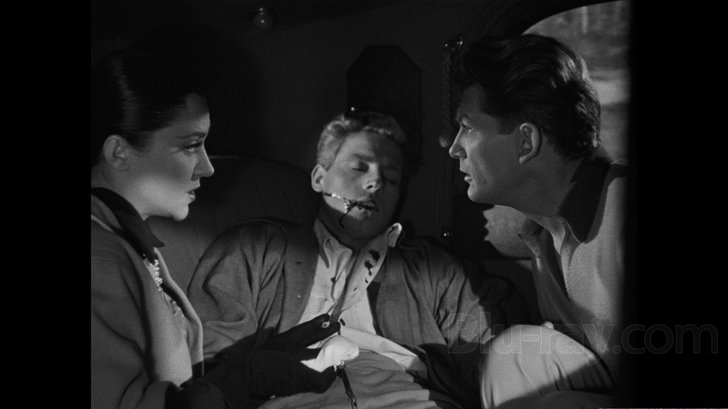
There is only one audio track on this Blu-ray disc: French LPCM 1.0. For the record, Criterion have provided optional English subtitles for the main feature.
The uncompressed monaural soundtrack handles legendary composer Georges Auric's beautiful and quite unusual music score wonderfully well. The mid-range dynamics, for instance, open up the film better than they do with the lossy track from the DVD release of Orpheus included in Criterion's Jean Cocteau's Orphic Trilogy. The overall dynamic balance is also improved. The dialog is crisp, clean, stable, and easy to follow. There are no problematic audio dropouts, hiss, or distortions to report in this review. The English translation is very good.
Orpheus Blu-ray Movie, Special Features and Extras 

- Trailer - the original theatrical trailer for Orpheus. In French, with optional English subtitles. (4 min, 1080p).
- Jean Cocteau: Autobiography of an Unknown Artist - a wonderful documentary film focusing on the life and legacy of Jean Cocteau. The film was directed by Edgardo Cozarinsky in 1984. In French, with optional English subtitles. (67 min, 1080i).
- In Search of Jazz - an episode of the French television series In Search of Jazz in which Jean Cocteau discusses the important role music has in his films. The French director specifically comments on the use of jazz in Orpheus. The program was first aired on April 24, 1956. In French, with optional English subtitles. (18 min, 1080i).
- Jean Cocteau and his Tricks - in this video interview, assistant director Claude Pinoteau discusses the special effects Jean Cocteau used in his films. The interview was conducted by filmmaker/writer/actor Marc Caro (Delicatessen, City of Lost Children, Dante 01) in 2008. In French, with optional English subtitles. (14 min, 1080i).
- 40 Minutes with Jean Cocteau - in this interview with Jean Cocteau, conducted by Francois Chalais and shot by Orpheus cinematographer Nicholas Hayer, the French director discusses his film work as well as his paintings in the church at Villefranche-sur-Mer and in the villa Santo-Sospir. The interview was presented as part of the French television series At Home With...and first aired on August 28, 1957. In French, with optional English subtitles. (41 min, 1080i).
- La villa Santo-Sospir - a short film directed by Jean Cocteau about the villa Santo-Sospir, on Côte d'Azur, which he decorated, and his home in Villefranche-sur-Mer. In French, with optional English subtitles. (37 min, 1080i).
- Stills by Roger Corbeau - a collection of stills by French portrait photographer Roger Corbeau. (1080p).
- Saint-Cyr Military Academy Ruins - a look at the French military academy at Saint-Cyr, bombed and destroyed in 1944, which appears as the "Zone" in Orpheus. The footage shows the ruins of the academy in 1950. Without sound. (2 min, 1080i).
- Commentary - a wonderful new audio commentary by French film scholar James Williams, who discusses the style and production history of Orpheus as well as Jean Cocteau's legacy. The audio commentary was recorded in London in May 2011.
- Booklet - an illustrated booklet featuring an essay by author Mark Polizzotti, selected Jean Cocteau writings on the film, and an essay on La villa Santo-Sospir by film scholar James Williams.
Orpheus Blu-ray Movie, Overall Score and Recommendation 
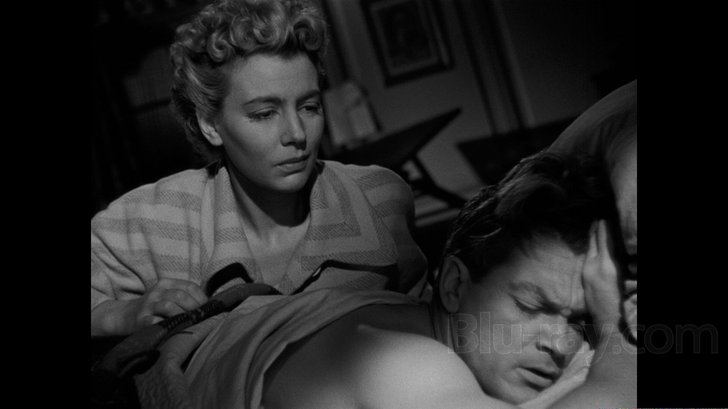
Criterion's treatment of Jean Cocteau's stunningly beautiful film is very impressive. I am convinced that those of you who are going to experience it for the very first time will be absolutely delighted with the presentation. The Blu-ray also arrives with a wealth of excellent supplemental features, including a brand new, very informative audio commentary by French film scholar James Williams. VERY HIGHLY RECOMMENDED.
Similar titles
Similar titles you might also like

Beauty and the Beast
La belle et la bête
1946

L' Atalante
1934

Children of Paradise
Les enfants du paradis
1945

The Double Life of Véronique
La double vie de Véronique
1991

Zéro de conduite
Zero for Conduct
1933

Les visiteurs du soir
The Devil's Envoys
1942

The Rules of the Game 4K
La règle du jeu / 1959 Reconstructed Version
1939

Vivre sa vie
Vivre sa vie: Film en douze tableaux / My Life to Live
1962

Pierrot le fou
1965

The Science of Sleep
2006

The Last Metro
Le dernier métro
1980

Jules and Jim
Jules et Jim
1962

Wings of Desire 4K
Der Himmel über Berlin
1987

Le silence de la mer
The Silence of the Sea
1949

Amélie
Le fabuleux destin d'Amélie Poulain
2001

Lola
1961

Three Colors: Red
Trois couleurs: Rouge
1994

Fanny and Alexander
Fanny och Alexander / Television and Theatrical Versions
1982

The Earrings of Madame de...
Madame de...
1953

Manon of the Spring
Manon des sources
1986